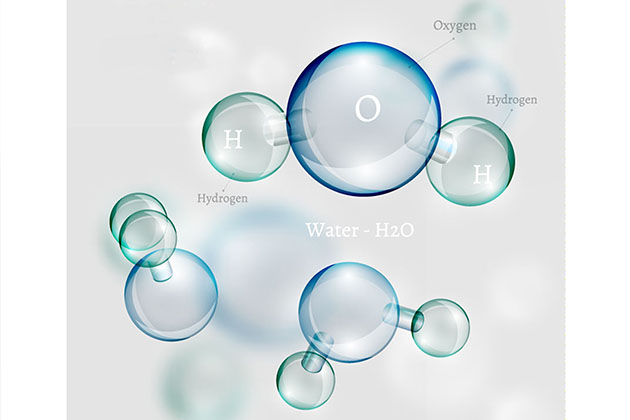Researchers have investigated for the first time how two different forms of water (ortho- and para-) behave differently when undergoing chemical reactions.
Water is a chemical entity, a molecule in which a single zuurstof atom is linked to two hydrogen atoms (H2O). Water exists as liquid, solid (ice) and gas (vapours). It is among the few chemicals which do not contain carbon and still can be liquid at room temperature (about 20 degrees). Water is ubiquitous and important for life. At the molecular level it is well known that everyday water exists in two different forms but this information is not of common knowledge. These two forms of water are called isomers and are referred to as ortho- or para- water. The main difference between these forms is very subtle and is simply the relative orientation of the nuclear spins of the two hydrogen atoms which are aligned in either same or opposite direction, hence their names. This spin of hydrogen atoms is due to atomic physics though this phenomenon is not yet fully understood. These two forms have identical physical properties and it has been believed so far that they should also then have identical chemical properties.
In een recent onderzoek gepubliceerd in NATUUR Communications, researchers from the University of Basel, Hamburg have for the first time investigated the difference in chemical reactivity of these two forms of water and have proven that ortho- and para- forms react very differently. Chemical reactivity means the way or the ability by which a molecule undergoes a chemical reaction. The study involved separation of water into its two isomeric forms (ortho- and para-) using an electrostatic deflector by involving electric fields. Since both these isomers are practically the same and have identical physical properties, this separation process is complex and challenging. The separation was achieved by this group of researchers by using a method based of electric fields developed by them for Free-Electron Laser Science. The deflector introduces an electric field to a beam of atomized water. Since there is crucial difference in nuclear spin in the two isomers, this slightly impacts the way by which atoms interact with this electric field. Therefore, as the water travels through the deflector it starts separating into its two forms ortho- and para-.
Researchers have demonstrated that para- water reacts around 25 percent faster than ortho-water and its able to attract to a reactie partner sterker. Dit wordt zeker verklaard door het verschil in de kernspin die de rotatie van de watermoleculen beïnvloedt. Ook kan het elektrische veld van parawater de ionen sneller aantrekken. De groep voerde verder computersimulaties van watermoleculen uit om hun bevindingen te bevestigen. Alle experimenten zijn gedaan met moleculen bij zeer lage temperaturen, bijna -273 graden Celsius. Dit is een belangrijke factor, zoals uitgelegd door de auteurs dat alleen onder dergelijke omstandigheden de individuele kwantumtoestanden en energie-inhoud van moleculen goed kunnen worden gedefinieerd en beter kunnen worden gecontroleerd. Wat betekent dat het watermolecuul zich stabiliseert als een van zijn twee vormen en dat hun verschillen duidelijk en duidelijk worden. Zo kan het onderzoeken van chemische reacties onderliggende mechanismen en dynamieken blootleggen die tot een beter begrip leiden. Het praktische nut van deze studie is op dit moment echter misschien niet erg groot.
***
{U kunt de originele onderzoekspaper lezen door op de DOI-link hieronder in de lijst met geciteerde bron(nen) te klikken}
Bron (nen)
Kilaj A et al 2018. Waarneming van verschillende reactiviteiten van para- en ortho-water naar ingesloten diazenyliumionen. Nature Communications. 9 (1). https://doi.org/10.1038/s41467-018-04483-3






































